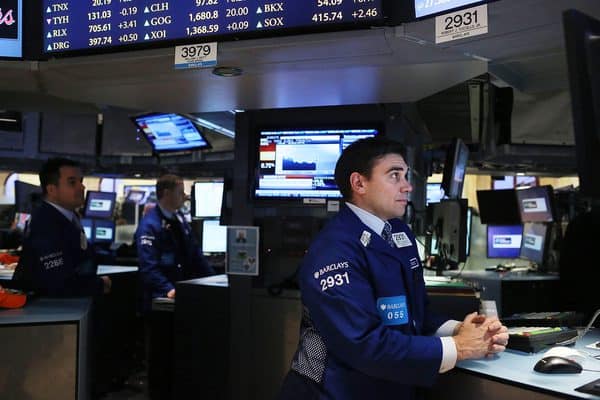
A late round of buying erased early losses on Wall Street, leaving major indexes mixed at the close of trading. Bigger companies managed to eke out modest gains, while smaller companies mostly fell.
A big gain in Boeing pushed the Dow Jones industrial average higher, breaking a five-day losing streak. Late in the day, energy companies got a boost after Exxon Mobil said it is raising its quarterly dividend.
Stocks got off to a weak start as investors worried that growing costs for raw materials along with rising interest rates would hold back profit growth for U.S. companies. Defense contractors stumbled following first-quarter reports from Northrop Grumman and General Dynamics.
U.S. bond yields rose again and set four-year highs while oil prices, already at three-year highs, continued to move higher.
Stocks had tumbled on Tuesday after companies including Caterpillar, 3M and Sherwin-Williams said they seeing higher costs. Caterpillar also said it doesn’t expect to top its first-quarter earnings for the rest of this year.
On Wednesday Goodyear Tire & Rubber said higher raw materials costs and weaker demand hurt its business in the first quarter. Its stock fell 5.1 percent to $25.51.
Invesco Chief Global Market Strategist Kristina Hooper said investors are starting to worry that the market’s best days are behind it. She noted that wages are rising, as unemployment has been at multi-decade lows for the last few years. That means costs for companies are up. Oil prices have also jumped and investors are worried that new tariffs will also drive up costs and affect company earnings in the months to come.
“I wouldn’t be surprised if earnings peaked by the end of this year, but certainly they haven’t peaked yet,” she said.
The S&P 500 index added 4.84 points, or 0.2 percent, to 2,639.40. The Dow rose 59.70 points, or 0.2 percent, at 24,083.83. The losing streak was its longest in more than a year.
The Nasdaq composite dipped 3.61 points, or 0.1 percent, to 7,003.74. The Russell 2000 index of smaller-company stocks lost 2.81 points, or 0.2 percent, to 1,550.47. Most stocks on the New York Stock Exchange fell.
Investors expected strong profit growth this year thanks to the growing global economy and the corporate tax cut President Donald Trump signed at the end of 2017. That optimism helped send stocks to record highs in January. Now investors are worrying about whether that growth will show up.
Aerospace company Boeing topped Wall Street’s estimates in the first quarter and raised its forecasts for the year. Its stock gained 4.2 percent to $342.86 and railroad operator Norfolk Southern climbed 8.1 percent to $145.96 after it, too, surpassed analyst projections.
Investors also monitored rising interest rates, which tend to slow down economic growth by making it more expensive for people and companies to borrow money. Bond prices fell again Wednesday, sending yields higher. The yield on the 10-year Treasury note kept setting four-year highs as it rose to 3.03 percent from 3 percent.
Low interest rates have played an important role in the economic recovery of the last decade, and the yield on the 10-year note is a benchmark for many kinds of interest rates including mortgages. It’s been climbing because investors expect higher economic growth and inflation. While investors expect the Federal Reserve to raise interest rates two more times this year, growing numbers of them now expect it to raise rates a third time after that.
Media conglomerate Comcast made a new offer to buy British broadcaster Sky, this time for $30 billion. Sky had accepted a $16.5 billion offer from 21st Century Fox. British regulators are investigating whether Fox’s bid for Sky would give Rupert Murdoch and his family too much control over the country’s news media.
Comcast also had a stronger first quarter than analysts expected, although it continued to lose cable subscribers. Its stock rose 2.7 percent to $34.26. Sky gained 3.9 percent in London. Fox rose 1.6 percent to $36.58, while Disney, which plans to buy most of Fox’s overseas and entertainment assets, climbed 1.7 percent to $101.15.
Germany’s DAX fell 1 percent and Britain’s FTSE 100 and France’s CAC 40 both lost 0.6 percent. Japan’s benchmark Nikkei 225 shed 0.3 percent. Hong Kong’s Hang Seng lost 1.1 percent and the South Korean Kospi lost 0.6 percent.
The dollar rose to 109.34 yen from 108.67 yen. The euro fell to $1.2175 from $1.2237.
Benchmark U.S. crude oil rose 0.5 percent to $68.05 a barrel in New York. It’s up 33 percent over the last 12 months and trading at its highest price in more than three years. Brent crude, used to price international oils, rose 0.2 percent to $74 a barrel in London.
Wholesale gasoline fell 0.2 percent to $2.09 a gallon. Heating oil rose 0.4 percent to $2.14 a gallon. Natural gas rose 0.2 percent to $2.79 per 1,000 cubic feet.
Gold fell 0.7 percent to $1,323.70 an ounce and silver sank 1.1 percent to $16.52 an ounce.
